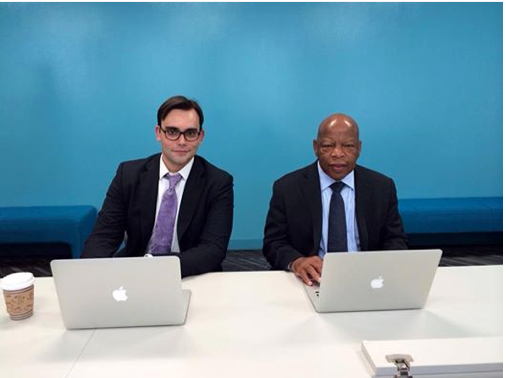
Lionized human rights advocate, civil rights leader and esteemed Congressman John Lewis chronicled his role in the transcendent, history-altering Civil Rights Movement and the iconic March on Washington through the stunning graphic portrayal of those turbulent yet immensely rewarding days in March: Book One.
He hosted a live Facebook chat on Monday, Sept. 22 with his supporters and fans, who were able to remotely ask the gentle giant of a man questions about what motivated him to do what he did, even against his parents admonishments to not get into trouble.
Lewis helped plan the March as a member of the Big Six that included Dr. Martin Luther King Jr., and on the eve of the historic day’s 50th anniversary, he’s collaborated with his staffer Andrew Aydin to write March, a graphic memoir that makes civil rights era jump off the page and also details Lewis’ extraordinary history and accomplishments, and the extraordinary valor he exemplified in the face of almost-certain death.
Lewis’ March commences by yanking you back emotionally to the frightening and horrific episode on the famous Edmund Pettus Bridge in Montgomery, Ala., immortalized in the American history books as “Bloody Sunday” as vengeful, vindictive police attacked peaceful, prayerful civil rights protesters with malice in their hearts.
Lewis, the offspring of sharecroppers in Pike County, Ala., to becoming the leader of the Nashville sit-ins and chairman of the Student Nonviolent Coordinating Committee (SNCC), to congressional leader and recipient of the Presidential Medal of Freedom, also propels us forward in March: Book 1 to Barack Obama’s inauguration.
Take a look at some of the Q&A from Rep. Lewis’ live Facebook chat:
Krista Kobeski Congressman Lewis, what is the most important lesson that we can take from this book which will help lead our world into a peaceful future?
John Lewis This book, a graphic novel March book 1, and there will be book 2 and book 3 tell us, all of us, the very young, that we have an obligation, a mission, and a mandate to do what we can to leave this planet a little more peaceful, a little greener, a little more respectful, and a little more human. As Dr. King said, “You must learn to live together as brothers and sisters or we will perish as fools.” And to put it another way, it’s non violence or non existience. They tell us, March tell us that hate is too heavy a burden to bear. The way of love is a much better way.
Cathy Coons I learn so much from your books and I look forward to adding this to my collection. Would this be good for young adults? It is so important to reach and teach our youth.
John Lewis This book is a must for young people of all ages. In recent days I’ve seen 7, 8 and 9 year olds reading the book. I’ve seen high school students, college students, reading the book and asking “When will book 2 come out?”. There are colleges and universities making this required reading for freshman. Georgia State University made it required reading for 3500 freshman. Michigan State Univeristy made it required reading for more than 8500 entering freshman. In the city of East Lanson, it has made one book one community – so the entire community is reading it. It’s not just good for young people and young adults. It’s good for all people to remember the way of peace, the way of love and the way of non violence. March is saying we must respect the dignity and worth of every human being. As humans, we all have a spark of the divine in us.
Anna Maske Hi Congressman Lewis, what can we do as a society to inspire younger generations to rely on nonviolence when participating in social movements?
John Lewis: It would be good – I know it’s impossible – but to take young people and people not so young back to some historic sites of the modern day movement. Back to Birmingham, back to Montgomery and to Selma, and witness the changes that have occurred. I think young people, and I know members of Congress who have traveled, are deeply moved by walking across the bridge in Selma, Alabama.
Sarah Mathews Hi Congressman Lewis. I am a professor of social studies education and I am responsible for preparing future social studies teachers. Yet I feel that social studies is ignored in today’s schools as we focus on reading and math. I am interested to know your thoughts about the state of youth civic engagement today. What lessons do you hope to impart from your experience on the youth of today? Do you think our youth face different battles and if so what is your advice for them?
Andrew Aydin Social Studies are incredibly important! How can we have an engaged democracy if we don’t teach our young people how to be good citizens? Young people need to read everything, learn, and engage with their community.
Brian Burns I submit that when nonviolent protesters are met with armored vehicles and riot gear, the tension becomes escalated on both sides and chaos ensues. We saw that in Ferguson. Why is the Federal Government arming local Police Departments these weapons and what should be done to end this madness?
Andrew Aydin It must stop, and in the face of such forces, conducting orderly and disciplined nonviolent protests becomes all that much more important. It is the only way to successfully dramatize the struggle. It was police brutality that the protestors in Selma faced, State Troopers fitted with gas masks, cattle prods and batons, and the violence they conducted shock the conscience of America, thereby forcing Congress and the President to act. We are going to have to do that again.
To read the rest of the Q&A session, log onto www.facebook.com/johnlewis
Congressman John Lewis' Live Facebook Chat for 'March: Book One'

